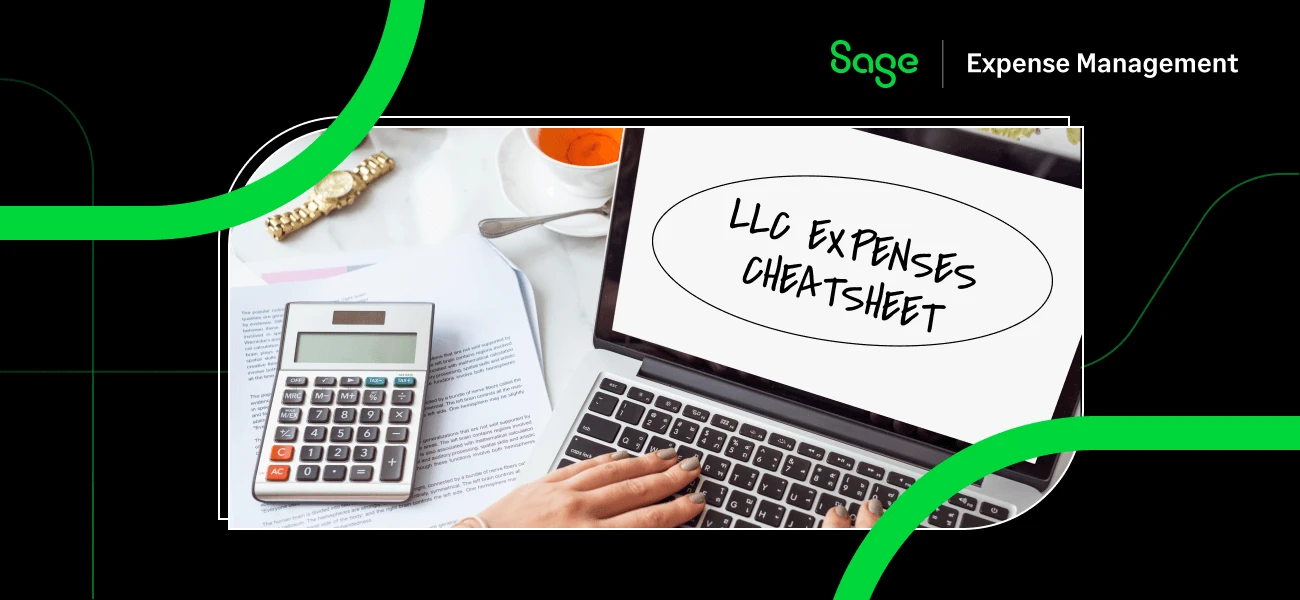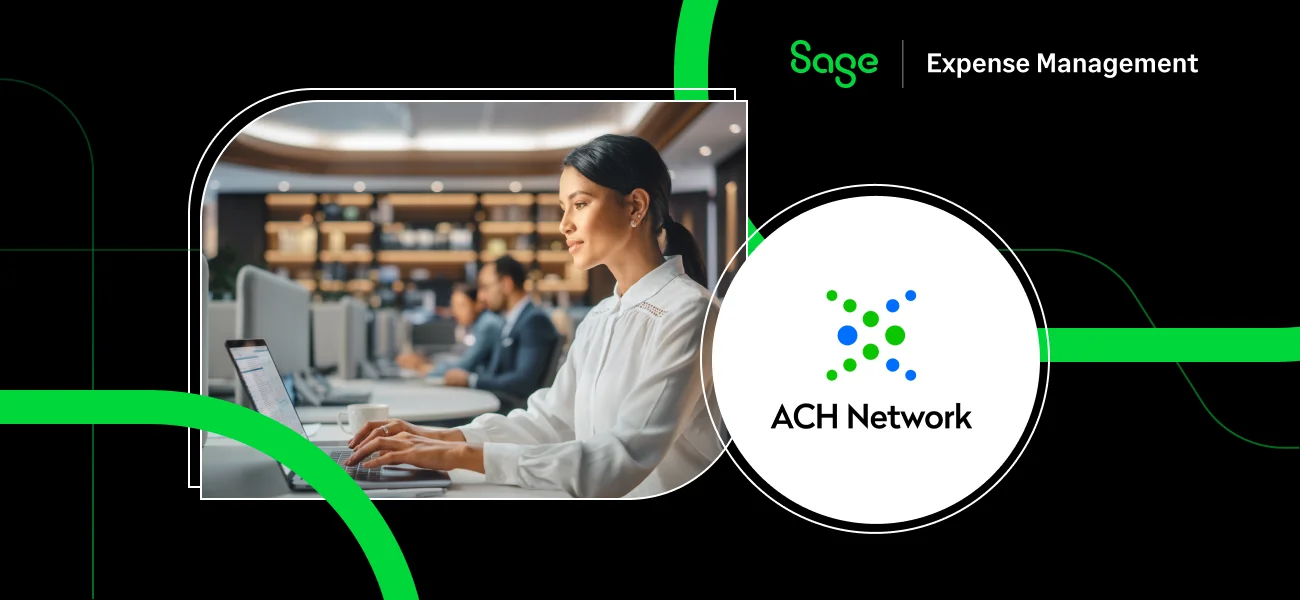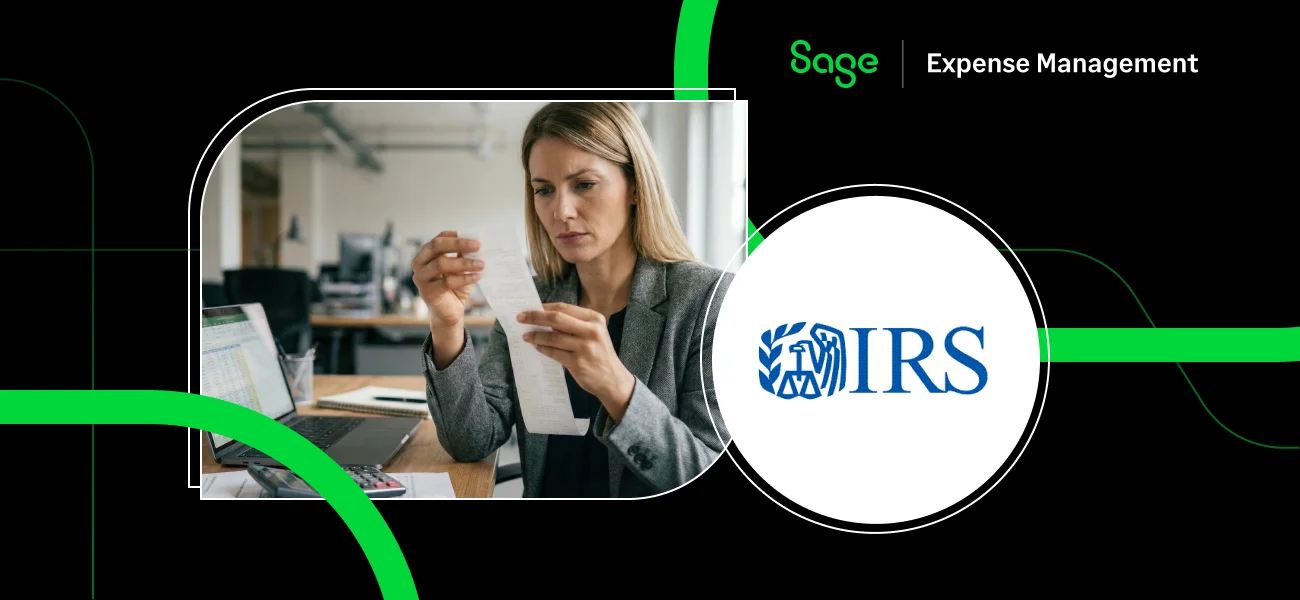Navigating tax-deductible expenses can be daunting, especially for LLC owners seeking to maximize tax benefits while maintaining financial stability.
This cheatsheet covers all the essentials on what LLC expenses qualify for deductions, what’s off-limits, and the best way to manage these expenses efficiently.
By the end, you’ll have a comprehensive understanding of what you can deduct, common expense categories, and how to make expense tracking a breeze.
How Does the IRS Define an LLC?

How Does the IRS Define an LLC?
A Limited Liability Company (LLC) is a flexible business structure allowed by state law, designed to protect owners, or ‘members,’ from personal liability for the company’s debts.
While state regulations govern LLCs, they’re typically taxed at the federal level as either a disregarded entity, a partnership, or a corporation, depending on the number of members and any elections made with the IRS.
- Single-member LLCs report income on their owners’ tax returns, often on Schedule C.
- Multi-member LLCs are generally treated as partnerships, requiring separate filings.
- Restrictions: Not all businesses can be formed as an LLC; banks and insurance companies are common examples of exclusions. Foreign LLCs must follow specific IRS rules.
This structure offers tax flexibility, as LLCs can choose their classification using Form 8832, tailored to their specific business needs.
What Are Tax-Deductible Business Expenses?

Tax-deductible business expenses are ordinary, necessary, and reasonable costs incurred for the operation of your business.
The IRS allows these expenses to be subtracted from gross income, reducing taxable income and, ultimately, tax liability.
These expenses should align directly with business needs, though some are only partially deductible depending on use and other requirements.
Examples of Common Tax-Deductible Expenses
Here are several examples of typical LLC business expenses eligible for deductions:
- Employee Wages and Salaries: Compensation paid to employees for their services.
- Rent or Lease Payments: Costs associated with renting or leasing property for business purposes.
- Utilities: Charges for electricity, water, and gas related to business premises.
- Insurance Premiums: Business insurance, including liability, property, and worker’s compensation.
- Loan Interest: Interest on business loans, such as those for purchasing equipment or financing operations.
- Depreciation on Business Assets: Spreading out the cost of significant purchases, like equipment or property, over its useful life.
- Taxes and Licenses: Costs associated with regulatory compliance, including license fees.
IRS Publication 535 provides an in-depth look at these business expenses. It also emphasizes categorizing expenses correctly between usual business expenses, Cost of Goods Sold (COGS), and capital expenditures. Unlike regular business expenses, capital expenses involve long-term assets (e.g., vehicles or property) that must be depreciated over time.
When Can I Deduct an Expense?
The timing of deductions depends on your chosen accounting method: cash or accrual. Each approach defines when income and expenses are reported, so selecting a method that accurately reflects your income is essential.
Accounting Methods Explained

Cash Accounting
The cash method allows you to deduct business expenses in the year they’re paid. For example, if you pay for supplies in December, you can deduct the expense in that same tax year.
Accrual Method
Under the accrual method, expenses are deducted when they’re incurred, regardless of when they’re paid. This method adheres to the “all-events test” and “economic performance” rules:
- All-Events Test: Requires that all events establishing the liability have occurred and the liability amount can be reasonably determined.
- Economic Performance: Requires that economic performance (i.e., the service rendered or product received) has occurred to justify the deduction.
Example: A repair company services your office building in December 2022 and bills you $600, but you pay in January 2023.
- Cash Method: You’d deduct the expense in 2023 when the payment was made.
- Accrual Method: You’d deduct the expense in 2022, as the service was performed then, fulfilling the economic performance requirement.
A Complete List of Tax-Deductible LLC Business Expenses
1. Utilities
Electricity, water, and gas costs related to business operations. If you work from home, only the business-use portion of these expenses is deductible.
2. Rent or Mortgage
Rent paid for business property is deductible if it meets the IRS's "reasonable rent" standards—particularly if paid to related parties.
Home-based LLCs can deduct a portion of rent or mortgage interest if there’s a dedicated workspace used solely for business. Deduction eligibility extends to associated costs, such as property taxes and insurance, based on the percentage of your home used for business.
3. Office Supplies and Assets
Office supplies, such as stationery, cleaning supplies, and paper towels, that are consumed and used during the tax year can be deducted. If you keep incidental supplies on hand and don't track inventory or usage precisely, you can often deduct the cost of supplies purchased during the year if the method doesn't distort income.
The distinction between a deductible supply and a capitalized asset is crucial.
Supplies are typically low-cost, short-lived items that are used up quickly. In contrast, office assets encompass a wide range of items, including land, buildings, machinery, furniture, patents, and franchise rights.
The entire cost of acquiring these assets, including freight and installation charges, must generally be capitalized, meaning the cost is recovered over time through depreciation or amortization, rather than being deducted in the year of purchase.
What is The De Minimis Safe Harbor Election?
While large assets must be capitalized, a de minimis safe harbor election may allow you to deduct the cost of smaller asset purchases immediately. To qualify, you must have written accounting procedures in place at the beginning of the tax year.
- With an Applicable Financial Statement (AFS): You can expense items costing up to $5,000 per invoice or item.
- Without an AFS: The deduction is limited to $2,500 per invoice or item.
This election is a powerful tool for businesses to simplify their bookkeeping by avoiding depreciation calculations for small-dollar assets.
4. Licenses and Permits
Fees paid to state or local governments for licenses and permits required to operate your trade or business are deductible. This includes annual renewals, but significant costs for licenses granting rights over a longer period may need to be amortized.
5. Printing
Business-related paper, ink, and other office supply costs, as well as printer repairs, qualify for deductions.
6. Software
The cost of off-the-shelf software and subscription fees for cloud-based software (SaaS) are deductible. For one-time purchases, depreciation rules may apply.
7. Internet
Domain registration, website hosting, and internet fees are deductible if for business purposes. The cost of internet service used for your business is a deductible utility expense.
8. Telephone
The cost of a dedicated business line is fully deductible for tax purposes. For a personal phone, you can deduct the business-use portion of the cost.
9. Bank Fees and Service Charges
Ordinary and necessary bank fees charged on your business accounts are deductible. This includes monthly maintenance fees, wire transfer fees, and stop-payment orders on business checks.
10. Business Insurance
Premiums for insurance that covers fire, theft, accident, liability, and workers' compensation are generally deductible. Premiums for health insurance for self-employed individuals are also deductible as an adjustment to income.
The premiums you pay for various types of business insurance are considered deductible as they are deemed ordinary and necessary for your business operations. Here’s a more detailed look at the types of insurance premiums you can deduct:
- Property and casualty insurance: This covers losses due to fire, theft, or other unforeseen events that affect your business property.
- Credit insurance: This protects you from losses if a customer's business debt becomes uncollectible.
- Health and medical insurance: Premiums for health coverage for your employees, including long-term care, are deductible. For partnerships, these premiums can be deducted as guaranteed payments.
- Liability insurance: This safeguards your business against legal claims from damages or injuries caused by your business activities.
- Malpractice insurance: This is crucial for professionals and covers claims of professional negligence.
- Workers’ compensation insurance: Premiums for this mandatory insurance, which covers employee injuries, are deductible.
- Unemployment insurance contributions: The amounts you contribute to a state unemployment fund are deductible if considered a tax under state law.
- Overhead insurance: This type of insurance covers business expenses you incur during a prolonged disability.
- Vehicle insurance: Premiums for business vehicles are deductible, but if the vehicle is used for both personal and business purposes, only the portion attributed to business use is deductible. If you use the standard mileage rate to calculate car expenses, you cannot deduct insurance premiums separately.
- Life insurance: You cannot deduct premiums for a life insurance policy if you are a direct or indirect beneficiary. This is a common rule to remember to avoid disallowance.
- Business interruption insurance: Premiums for this insurance are deductible, as it compensates for lost profits due to business disruptions.
Remember, you cannot deduct amounts you credit to a self-insurance reserve fund. You can only deduct premiums paid to a third-party insurance provider.
11. Legal and Professional Expenses
Fees paid to professionals like lawyers, accountants, consultants, and tax preparers are deductible if they are ordinary and necessary for operating your business.
12. Marketing
Marketing costs are deductible if they promote your business and are reasonable in nature. This includes digital and print advertising, brand goodwill efforts, and local sponsorships directly related to your business.
13. Gadgets
Deduct devices used primarily for work, such as cell phones, laptops, and tablets. Special rules and stricter record-keeping apply to "listed property," which includes these assets, to prove business use exceeds 50%.
14. Bad Debts
A business bad debt is a loss resulting from a debt that becomes worthless and arises from your trade or business. This can include an uncollectible loan to a client or supplier for a business reason. To claim a deduction, you must be able to demonstrate that the debt is worthless and you've taken reasonable steps to collect it.
This is distinct from bad debts from credit sales, as business bad debts can arise from loans made to suppliers, clients, or employees for business purposes that become uncollectible. Worthless business loan guarantees can also result in a bad debt deduction if specific criteria are met. The debt must have been created or acquired in the business, or closely related to it, when it became worthless.
15. Payroll
Wages, bonuses, and other compensation paid to employees are deductible as long as they are reasonable and for services performed. As the employer, you can also deduct employee benefits like retirement plan contributions, health insurance, and adoption assistance.
- The "Reasonable" Test: Employee pay is considered reasonable if it reflects the true value of the work and is similar to what others in the industry would be paid for the same job. The IRS considers factors such as the employee's job duties, the complexity of the business, and the individual's experience and accomplishments to determine if the pay is reasonable.
- The "For Services Performed" Test: You must be able to prove that the payments were for services actually rendered to the business. You should maintain detailed records to substantiate that the work was performed and that the compensation was for those services.
16. Medical Expenses
Self-employed LLC owners can deduct premiums paid for medical, dental, and qualified long-term care insurance for themselves, their spouse, and their dependents. This deduction is taken as an adjustment to income on Schedule 1 (Form 1040) and is limited to the net profit from the business.
17. Employee Benefit Programs
Costs for qualified employee benefit programs are deductible as business expenses. These programs are designed to provide employees with benefits in addition to their wages. Examples of these programs include:
- Group-term life insurance: Premiums paid for this type of insurance are deductible, provided you are not the direct or indirect beneficiary of the policy.
- Adoption assistance programs: These programs can provide financial assistance to employees for qualified adoption expenses.
- Dependent care assistance programs: These programs help employees cover the costs of caring for their dependents while they are at work.
18. Licenses and Permits
Fees paid to state or local governments for licenses and permits required to operate your trade or business are deductible. This includes annual renewals. However, significant costs for licenses that grant rights over a longer period may need to be capitalized and amortized over time rather than deducted immediately.
19. Business Trip Expenses
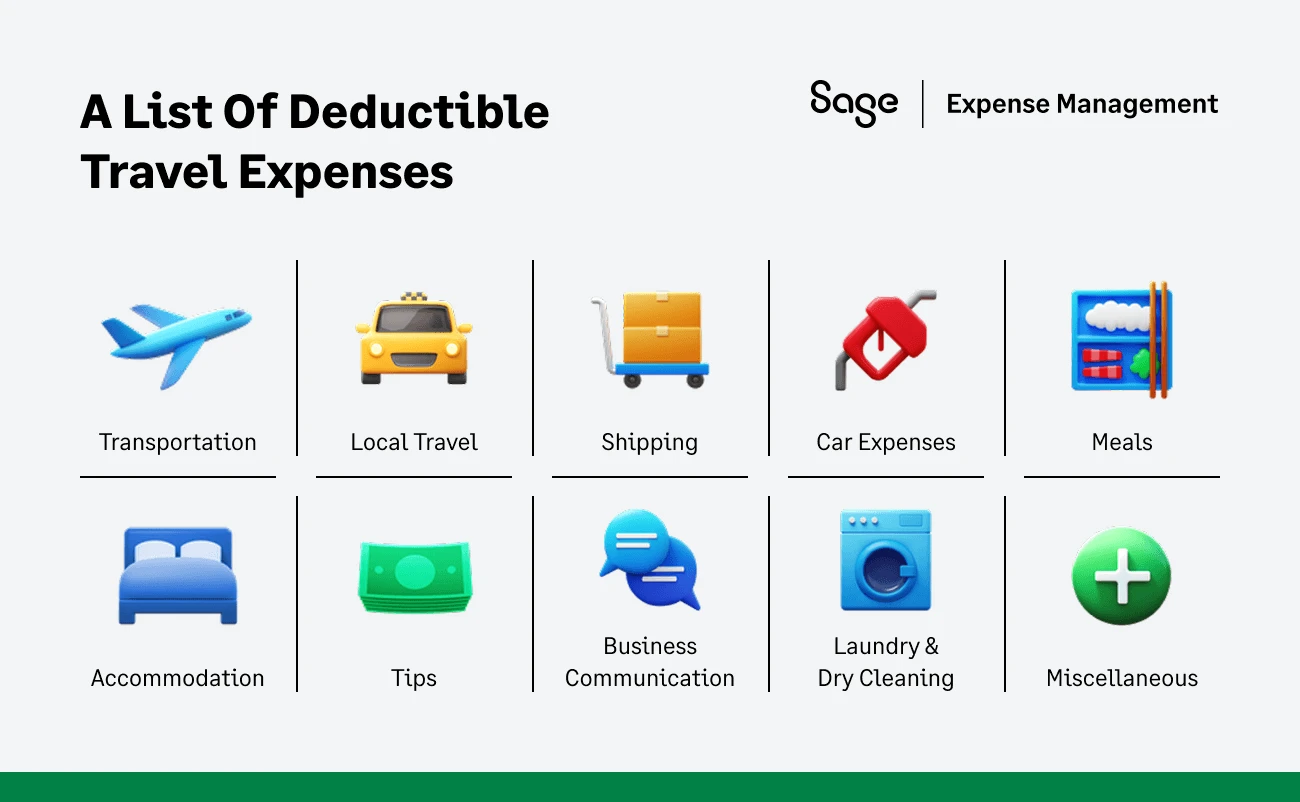
Ordinary travel expenses for employees and owners traveling away from their primary work location qualify as deductions. You are considered to be "away from home" if you are away from the general area of your tax home for a period substantially longer than an ordinary workday and you need to sleep or rest to perform your duties properly. The trip's primary purpose must be for business.
Deductible travel costs can include:
- Transportation: The cost of flights, trains, or buses between your home and your business destination.
- Car Expenses: The cost of operating and maintaining your car, including tolls and parking fees. You can deduct either the standard mileage rate or actual car expenses.
- Accommodation: Lodging costs for business travel.
- Meals: Meals are generally deductible, but a 50% limit applies.
- Other Essentials: This includes fares for taxis or buses, baggage fees, laundry and dry cleaning, and business phone calls made during the trip.
20. Business Gifts
You can deduct the cost of gifts given to clients, customers, or employees, but the deduction is limited to $25 per recipient per year. Incidental costs like packaging, engraving, or mailing do not count towards this limit unless they add substantial value.
Exceptions:
- Promotional items costing $4 or less with your name permanently imprinted.
- Items like signs or display racks for the recipient's business premises.
These items are not considered gifts and are not subject to the $25 limit.
21. Car Expenses
If you use your car for business, you can deduct expenses using one of two methods:
- Standard Mileage Rate: For 2026, the standard mileage rate for business use is 72.5 cents per mile.
- Actual Car Expenses: You can deduct the business-use portion of expenses such as gas, oil, repairs, insurance, and license fees.
To support your deduction, you must maintain adequate records. This includes a log showing the date of use, mileage for each business use, and the total miles for the year.
Also Read
22. Startup and Organizational Costs
The IRS allows you to deduct a portion of the costs incurred before you officially open your doors. These costs fall into two categories:
- Startup costs: Expenses for creating an active business or investigating its creation or acquisition.
- Organizational costs: Expenses related to forming a corporation or partnership.
You can elect to deduct up to $5,000 for each category in the tax year your business begins. Any costs above this initial deduction must be amortized over 180 months (15 years). This deduction is reduced dollar-for-dollar if your total startup or organizational costs exceed $50,000.
23. Maintenance and Repairs
The costs for routine maintenance and repairs that keep your business property in a normal operating condition are generally deductible in the year you incur the cost. Think of these as keeping things running smoothly, not fundamentally changing them.
However, costs that result in a "betterment" to the property, restore it to like-new condition, or adapt it to a new use must be capitalized and recovered through depreciation. For example, fixing a leak in the roof is a deductible repair, but replacing the entire roof would be a capital improvement.
24. Depreciation
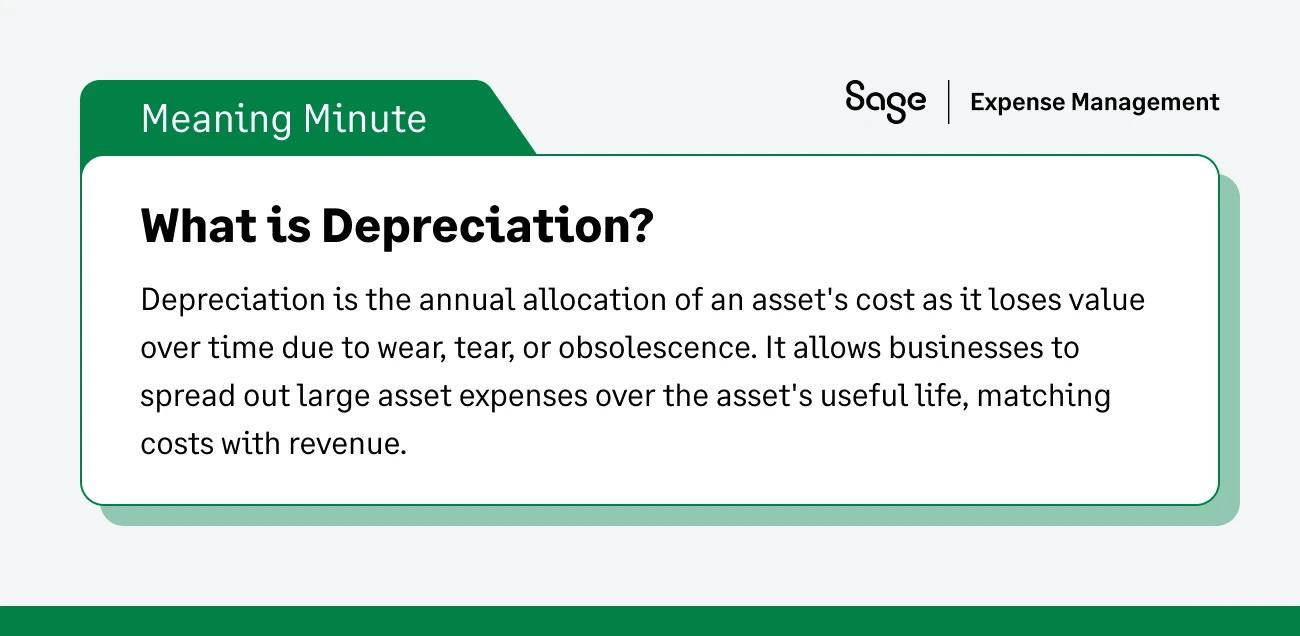
Depreciation is the process of gradually deducting the cost of tangible business assets that are expected to last more than a year. This method accounts for the asset's wear and tear or obsolescence over its useful life, rather than deducting the entire purchase price at once.
What Qualifies for Depreciation?
Depreciation applies to assets like buildings, machinery, equipment, furniture, and vehicles that are owned and used for business or to produce income. Assets must have a useful life that can be determined, as land and inventory held for sale cannot be depreciated.
Depreciation Systems
The primary method used for most property is the Modified Accelerated Cost Recovery System (MACRS), which assigns assets to specific property classes with defined recovery periods.
Special Deductions for Depreciation
- Section 179 Deduction: This allows businesses to deduct the cost of certain qualifying property in the year it's placed in service, subject to dollar limits.
- Special (Bonus) Depreciation Allowance: An additional first-year deduction for certain qualified property, with the percentage currently phasing down.
Recordkeeping for Depreciation?
Stricter recordkeeping rules apply to "listed property," such as passenger automobiles, due to their potential for personal use. Consulting IRS Publication 946, How to Depreciate Property, is highly recommended for detailed guidance.
25. Amortization
Amortization is the method for deducting the capitalized cost of certain intangible assets over a set period, usually straight-line. This is similar to depreciation, but it applies to assets that lack a physical form.
This deduction applies to acquired Section 197 intangibles (like goodwill, patents, copyrights, customer lists, and franchises), costs of getting a lease, and pollution control facilities. The amortization period is often 15 years for Section 197 intangibles.
26. Depletion
If your business involves extracting natural resources like minerals, oil, gas, or timber, you can deduct depletion. Depletion is a method similar to depreciation but applies to natural resources, accounting for the using up (depletion) of the resource as it is extracted and sold.
There are two primary methods for calculating depletion, and you generally use the one that gives you the larger deduction:
- Cost Depletion: This method is based on the unrecovered cost of the property and the number of units (e.g., tons of ore, barrels of oil) that you've produced during the tax year.
- Percentage Depletion: This method allows you to deduct a specific percentage of the gross income from the property, regardless of your cost basis. This method is generally used for most minerals, oil, and gas, but it is not available for timber.
27. Research and Experimental Costs
Research and experimental costs are expenses a business incurs in developing a new product or improving an existing one. As of January 1, 2022, a business can no longer elect to deduct these costs in the year they were incurred. Instead, these expenses must be capitalized and amortized over a set period.
- Domestic Research: The costs for specified research or experimental expenditures conducted within the U.S. must be amortized ratably over a 5-year period.
- Foreign Research: Costs related to foreign research must be amortized over a 15-year period.
This change to the tax code requires businesses to adjust their accounting for these types of expenses, moving from a direct deduction to a long-term amortization schedule.
28. Foreign Earned Income
If your business operates internationally, you may incur foreign taxes. You have two primary options for handling these foreign taxes:
- Deduction: You can take a deduction for foreign income taxes paid or accrued against your business income.
- Foreign Tax Credit: You can claim a foreign tax credit, which is often more beneficial than a deduction, as it directly reduces your U.S. tax liability.
Foreign real property taxes paid on business property located abroad are also deductible. Other foreign taxes directly attributable to your trade or business may also be deductible. You can find more details on these rules in IRS Publication 54, and information on the foreign tax credit in IRS Publication 514.
29. Charitable Contributions
While direct charitable contributions made by a sole proprietorship are generally taken as personal itemized deductions (if eligible) on Schedule A, payments made to charitable or other organizations might be deductible as business expenses if they bear a direct relationship to your business and you can reasonably expect a financial return commensurate with the amount paid.
For example, sponsoring a table at a charity event where you prominently advertise your business might qualify as a marketing expense rather than a charitable contribution. Corporate charitable contributions have specific rules.
30. Dues and Subscriptions
You can deduct dues paid to professional organizations and trade associations that are related to your business. This can include memberships in groups like bar associations, medical associations, or local chambers of commerce. Subscriptions to professional, technical, and trade journals that deal with your business field are also deductible.
However, dues paid to clubs organized for business, pleasure, recreation, or other social purposes (like country clubs or golf clubs) are generally not deductible.
Non-Deductible LLC Business Expenses
The IRS prohibits deductions on certain expenses because they either don’t support business operations directly or are illegal. These include:
- Bribes and Kickbacks: Payments made to gain a business advantage.
- Charitable Contributions: Contributions, unless treated as advertising, are not deductible for LLCs.
- Demolition Expenses: Related to tearing down existing structures.
- Dues to Social Clubs: Memberships for clubs unrelated to business (e.g., country clubs).
- Entertainment Expenses: Includes events, recreational activities, and related expenses.
- Improvements: Structural improvements or betterments to business property.
- Lobbying Expenses: Payments for influencing legislation or government actions.
- Penalties and Fines: Payments for breaking laws.
- Personal, Family, and Living Expenses: Any non-business expenses, including family costs.
- Political Contributions: Donations to political parties or campaigns.
- Settlements for Sexual Harassment or Abuse: Deducting settlements subject to nondisclosure agreements is prohibited.
How to Track and Manage LLC Expenses?
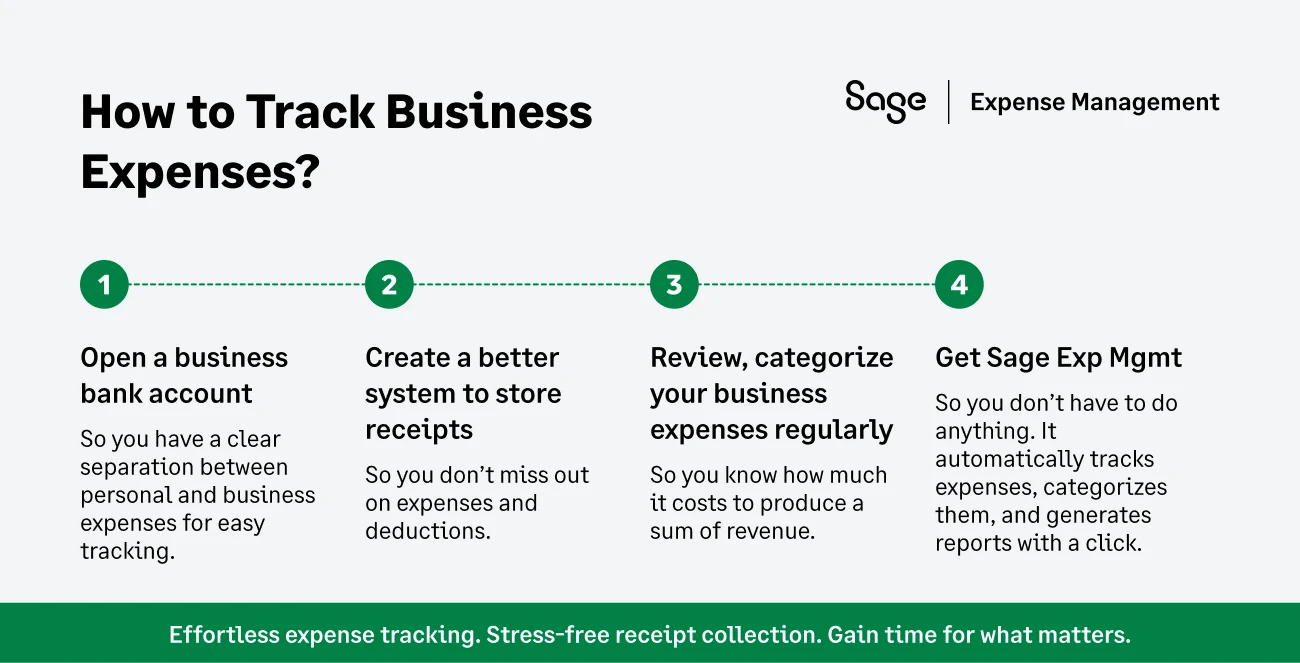
Managing expenses accurately is crucial for tax compliance and maximizing deductions. Here are some strategies:
Open A Business Bank Account
Open a dedicated business bank account to keep business and personal finances separate. This separation simplifies record-keeping and provides a clear audit trail, especially if you’re ever audited.
Additionally, a business account can help build your LLC’s credit profile, making it easier to secure loans or other financial products in the future.
Track Your Expense Receipts
Use digital or physical copies showing expense details (date, amount, and business purpose).
Physical vs Digital Receipts
Physical receipts should be stored carefully, though digital copies can simplify tax preparation and reduce paper clutter. The IRS considers a receipt "adequate" if it includes the vendor's name, the date of purchase, an item description, and the amount paid.

Establish A Clear Expense Policy
For LLCs with multiple members or employees, having a defined expense policy can prevent misclassifications.
Outline what qualifies as a deductible business expense, set spending limits, and include guidelines on the required documentation for reimbursements. This policy helps ensure everyone follows the same standards, which aids in consistent and accurate expense tracking.
Leverage Multiple Expense Categories
Certain specific categories for expenses (e.g., utilities, marketing, travel) are essential for accurate record-keeping. Use categories that align with IRS guidelines for business deductions.
Not only does this help streamline tax filing, but it also provides insights into where your LLC is spending most of its resources, helping you make more informed decisions.
Maintain Records Of Business Travel Spending
Business travel expenses can add up quickly, so it's important to maintain thorough records of these costs. Document transportation costs, accommodation, meals, and any other travel-related expenses.
Also, note the purpose of each trip and keep receipts for all qualifying expenses. If you use a personal vehicle for business, maintain a mileage log that records the dates, destinations, and miles driven.
Regular Expense Reviews
Conduct regular reviews of your expenses, ideally on a quarterly basis. Reviewing your LLC’s expenses helps catch any missed deductions, provides an opportunity to address wasteful spending, and enables more accurate year-end planning. These periodic checks can also help identify patterns in spending, so you can make adjustments if needed before the year closes.
How Sage Expense Management (formerly Fyle) Can Help LLC Expense Management

Sage Expense Management automates expense tracking for LLCs, allowing you to focus on growing your business without the hassle of manual tracking. Here’s how it works:
- Text Message Receipt Submission and Automated Credit Card Reconciliation: Sage Expense Management integrates with all major credit card networks, notifying you instantly when a credit card transaction occurs. Text a receipt image, and we will match it to the transaction, simplifying expense management.
- Submission via Everyday Apps: Submit receipts from platforms like Slack, Gmail, Outlook, and Teams and auto-assigns expenses to categories.
- Real-Time Spend Visibility: The Sage Expense Management dashboard displays credit card expenses by category, employee, or department, giving you a real-time view of spending.
- 2-Way Integration with Accounting Software: Sage Expense Management syncs with all prominent accounting tools like Quickbooks, Xero, Sage, and more, automatically importing expenses and reducing manual entries.
- Responsive Customer Support: Get 24/7 support, with a 92% satisfaction rating and fast response times, ensuring smooth onboarding and troubleshooting.
In Conclusion
Managing LLC expenses effectively can be a game-changer for your business. It can keep you compliant and help maximize tax savings.
By carefully tracking deductible expenses, categorizing them accurately, and staying organized, you can confidently approach tax season and make the most of your eligible deductions.
Streamlining these tasks becomes even more accessible with tools like Sage Expense Management, which offers real-time tracking, seamless receipt management, and automated integrations with accounting software.
Ready to take the hassle out of LLC expense management? Sign up for a Sage Expense Management demo today and see how effortless expense tracking can be for your business.
{{receipt-chasing="/cta-banners"}}
FAQs Around LLC Business Expenses
What Expenses are Tax-Deductible For an LLC?
Any expense that counts as ordinary and necessary to conduct business can be deducted as a business expense.
What Expenses are Not Tax-Deductible?
Personal expenses, entertainment expenses, fines or penalties paid to a government for violating a law, illegal payments, and dues to various country clubs cannot be written off.
What about Home Office Expenses?
Home-based LLCs can deduct a portion of their rent or mortgage interest if there is a dedicated workspace used exclusively and regularly for business.
How Long Do I Need to Keep Records for my LLC?
The general rule is to keep records for 3 years from the date you filed the original return. However, you must keep records for 7 years if you claim a bad debt deduction or a loss from worthless securities. Records related to property should be kept indefinitely, or at least until the period of limitations expires for the year in which you sell or dispose of the property.
Can an LLC Take the Standard Deduction and Still Deduct Business Expenses?
Yes. Business expenses are deducted from your gross income to determine your adjusted gross income, while the standard deduction (or itemized deductions) is taken from your adjusted gross income. Therefore, you can take the standard deduction and still deduct your business expenses.
How Do I Deduct Car Expenses For My LLC?
You can deduct car expenses using either the standard mileage rate (67 cents per mile for 2024) or actual car expenses, such as gas, oil, repairs, and insurance. You must maintain a log of business mileage, dates, and business purpose to prove your expenses.
How are Startup Costs for an LLC handled?
The IRS allows you to deduct up to $5,000 in startup costs and an additional $5,000 in organizational costs in the year your business begins. Any remaining costs must be amortized over 180 months.
What is the Difference Between a Deductible Expense and a Capital Expense?
A deductible expense is a cost that is both ordinary and necessary for business operations and can be deducted in the current year. A capital expense, on the other hand, is an investment in a business asset that must be capitalized and recovered over time through methods like depreciation or amortization.



.webp)
